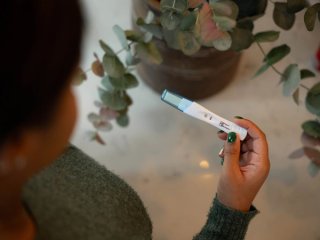
- Home
- Advice Hub
- Conception
- Signs Of Pregnancy
- Early Pregnancy Symptoms
Early Pregnancy Symptoms
Learn about early pregnancy symptoms, from morning sickness to fatigue, and understand what to expect in the first weeks of pregnancy with expert insights.
What are the common early signs of pregnancy?
If you are wondering how early pregnancy symptoms start, and any potential very early pregnancy symptoms, then you’re in the right place as we share some of the symptoms, the cause and how long they may stick around for.
Hormonal changes in the body are occurring as your body prepares to grow a baby. Pregnancy hormones, specifically human chorionic gonadotropin (which you may have heard of as ‘HcG’) cause these symptoms.
It’s important to remember that all pregnancies are different, and the experiences of symptoms can vary a lot. If you are pregnant and have not noticed any changes in your body, this is nothing to worry about. At the same time, if you are experiencing some symptoms more severely or are feeling concerned, you should always contact your GP or midwife.
Missed period
One of the most obvious early pregnancy symptoms is a missed or late period. If you have a regular cycle, being late could be a sign that you are pregnant, but there can be other reasons for having a late period, such as stress or being unwell. Additionally, some very light bleeding or ‘spotting’ can happen in the early weeks of pregnancy, known as implantation bleeding, which can be confusing very early in pregnancy.
Nausea and vomiting
Feeling nauseous or vomiting is a common symptom in early pregnancy and can happen at any time of day. This symptom often begins around 4-6 weeks of pregnancy and is caused by hormonal changes in the body. For most women, this does settle at around weeks 12 to 13 of pregnancy. Sickness can occur in a more severe way causing extreme nausea, vomiting, dehydration, and weight loss. It is advised to seek medical advice from your GP or midwife if vomiting occurs more than 2-3 times a day or you are unable to function normally.
Breast tenderness and soreness
A feeling of tenderness in the breasts is sometimes the first change noticed, sometimes as early as the first few weeks of pregnancy. Pregnant women report feelings of tenderness, swelling, or bruising in their breasts. Visible changes can also occur, with a darkening of the areolas and more noticeable veins. Tenderness in the breasts will often settle down as your body adapts to the hormonal changes happening throughout your body.
Fatigue
Tiredness during early pregnancy is a common experience. Your body is working hard to support your baby’s development with lots of hormonal changes, as well as growing the placenta. It is encouraged to rest when you can, eat well and drink plenty of water to keep up your energy levels.
Urinating more often
Frequent trips to the toilet are one of the earliest pregnancy symptoms, sometimes as early as 4 weeks, due to increases in the pregnancy hormone known as hCG. This often eases off by weeks 12 to 13, but makes a comeback in the third trimester when your baby can press on your bladder.
Cravings
Food cravings and food aversions can occur during early pregnancy. Hormonal changes that change taste and smell can result in craving specific foods or a sudden distaste for others. Although less common, women can develop cravings for non-food items, a condition known as pica. Pica may be linked to underlying nutritional deficiencies, such as iron or zinc. If you experience unusual cravings for items like dirt, clay, or chalk, it is important to speak to your GP or midwife.
Mood swings
Sudden changes in mood, such as feeling emotional or irritable is a common response to the many changes happening around the body. Whilst some tearfulness or feeling down are normal, if these feelings persist or become overwhelming, it’s important to speak with your GP or midwife. Mental health is just as important as physical health during pregnancy, and you may need some extra support.
Heightened sense of smell
Changes to your sense of smell is common in early pregnancy and can make certain scents overwhelming or even make you feel sick or nauseous. Foods and smells that you usually like can become off-putting, and some women report a metallic taste in their mouth. These changes are both linked to hormonal changes. Changed smells can be an unpleasant addition, but luckily these usually improve as the pregnancy progresses and are usually gone once the baby is born.
Other Symptoms of Early Pregnancy
Your body goes through so many changes during early pregnancy and you may experience some of the lesser known symptoms:
You may notice a backache early on as your body adjusts to hormonal changes. Some people report feeling breathless - that’s because your body needs more oxygen, which can sometimes leave you feeling a little out of breath. Headaches might pop up due to hormonal changes and increased blood flow throughout the body. You may notice some leg cramping, especially at night. Try stretching and drinking enough water to ease them.
An increase in vaginal discharge can be common and helps protect against infections. However, if it has a bad smell or causes discomfort, it’s a good idea to speak with your GP, as you may find yourself more prone to vaginal infections like vaginitis.
Changes in blood volume throughout the body can cause a few different symptoms including varicose veins and constipation. Even your wrists might feel the effects, with swelling sometimes compressing nerves and causing tingling or numbness, known as carpal tunnel syndrome.
When to get help
Each pregnancy is unique, and you may experience very few, or even no symptoms during your early pregnancy. However, it’s important to remember that if anything feels unusual or worrying, don't hesitate to speak to your GP or local midwife service.
It’s important to seek immediate medical advice from your midwife or maternity unit if you experience:
- Severe pain, vaginal bleeding, or frequent urination.
- Severe headaches, blurred vision, or swelling in your face or hands.
- Severe pain below the ribs or vomiting.
- Pain or swelling in your leg, chest pain, or coughing up blood.
- Changes in discharge colour, smell, or if you feel sore or itchy.
Do not wait for your next appointment if any of these symptoms arise.
FAQs around early pregnancy symptoms
Some women may begin noticing the first early signs of pregnancy a week or two after conception, while others will start to feel symptoms closer to four or five weeks. Some women may not feel symptoms until their period is noticeably late, or even further into pregnancy.
It is unlikely that pregnancy symptoms will be experienced as early as 2 days after conception. Some women report experiencing symptoms of pregnancy as early as 5 or 6 days after conception.
Very early symptoms of pregnancy include fatigue, breast tenderness and some mild cramping. These might appear as early as one week after conception.
You can take most pregnancy tests from the first day of a missed period. If you are not certain about your period dates, wait at least 21 days after having unprotected sex. Modern tests can often detect pregnancy around 3 weeks after unprotected sex.

